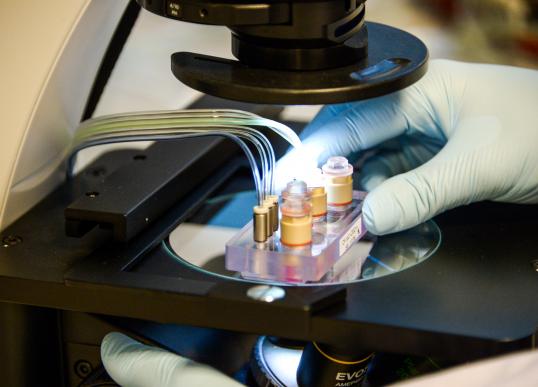The JRC’s EU Reference Laboratory for alternatives to animal testing (EURL ECVAM) has an extensive experimental facility used for the development, validation and standardisation of in vitro methods.
In addition, EURL ECVAM coordinates an international network of in vitro facilities (EU-NETVAL) that supports the validation and implementation of in vitro methods intended for regulatory use.
Explore in 360° the ECVAM laboratory
Our laboratory activities
We primarily focus on in vitro (cell-based) and in chemico (chemical based) methods with the aim of demonstrating how non-animal based approaches can reliably provide relevant toxicological and physiochemical property information needed for chemical hazard and risk assessment.
The laboratories in our facility provide a wide range of state-of-the-art instrumentation for setting up and carrying out both small and large scale in vitro studies that use different cell and tissue models and a variety of advanced end-point detection methods.
High Throughput Testing (HTT) laboratory
The High Throughput Testing (HTT) laboratory is set up to produce large amounts of data on large chemical libraries with high precision and speed.
The core instruments of the lab are two fully automated HTT platforms. Each platform is comprised of two liquid handling robots (Hamilton STAR and STARlet), a robotic arm (Hamilton HMotion), an automated microplate washer (Biotek), an automated incubator (Thermo Cytomat) and two multimode microplate readers (BioTek Synergy).
The HTT platforms can be used for in chimico and in vitro assays (including live-cell analysis) in 96- and 384-well plate formats. Readouts can be luminescence, fluorescence or absorbance based.
High Content Imaging (HCI) laboratory
The High Content Imaging (HCI) laboratory is equipped with two automated multifunctional HCI platforms from Thermo Scientific, the ArrayScan VTI XT and the confocal laser Cellinsight CX7 LZR. The platforms incorporate an incubator and a robotic arm that allow fully automated handling and imaging of fixed or live-cell cultures in multi well plates, and on-the-fly image analysis and quantification of biological readouts.
Organ-on-chip (OoC) laboratory
An Organ-on-Chip (OoC) refers to a fit-for-purpose microfluidic device, containing living engineered organ substructures in a controlled microenvironment. The aim of an OoC is to replicate one or more aspects of the organ’s dynamics, functionality and (patho) physiological response in vivo.
EURL ECVAM runs a state-of-the-art OoC laboratory, with all the instrumentation and expertise needed to replicate relevant case studies and to investigate the use of these technologies for safety and efficacy testing.
One important feature of OoC is the possibility to integrate multiple organs on the same chip and connect them with a physiological fluid flow. Thus, it is possible to study organ-organ interactions and complex biological problems. The OoC device we have in-house allows the combination of 2 to 4 different organs, with pressure-driven, integrated micropumps that can continuously circulate the media in the fluidic circuits. The control device is able to manage up to eight parallel circuits (in the 2-organ configuration) or four parallel circuits (in the 3- and 4-organ configurations), balancing between complexity and throughput.
Multi Electrode Array (MEA) laboratory
Microelectrodes and recording technologies can capture the electrical signals produced by neurons or cardiomyocytes without penetrating the cell membrane. This allows us to record electrical signals from entire cell populations. In such a multielectrode array (MEA), arrays of electrodes are distributed over a large area and can simultaneously record electrical activity from thousands of cells. In our laboratory the MEAs are utilized for in vitro cell cultures for label free toxicity testing and functional characterisation of cell models. The use of the multiwell MEAs allows us to increase the throughput and perform several experiments contemporarily.
The Multiwell-MEA system (Multi Channel Systems MCS GmbH) featuring a 24- or 96-well plate format, is especially suited for high throughput screening. The plates, being SBS-compliant, can also be used on our robotic High Throughput Screening Platform for cell plating and compound application. The head set hosting the multiwell plates containing gold electrodes allows the signal amplification, detection and freely programmable stimulation.
A high sampling rate (up to 50 Hz per channel, simultaneously on all channels) guarantees the accuracy of the data. An included software, Multiwell-Screen, is used for data recording and analysing.
Contact



